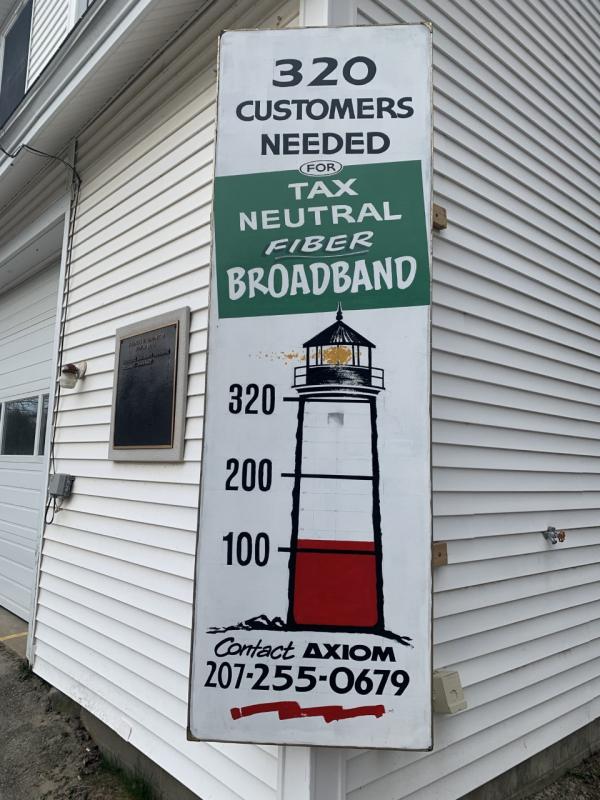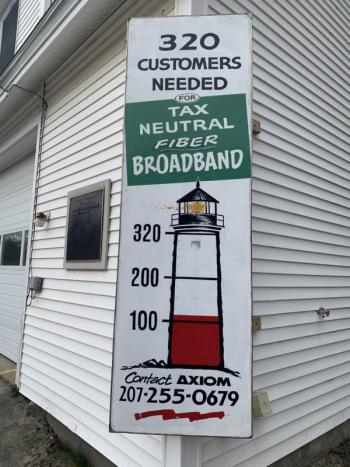Selectman Smith Climo calls the proposed municipally owned broadband project “the future.” On June 28, residents will head to the polls to vote on three referendum questions regarding the $2.1 million project. The first article would revoke authority given to selectmen creating the municipally owned network. The second would create a fund connecting the 10% of addresses without internet services. The final question would affirm last year’s vote.
Southport will have the second of two public informational hearings at 6 p.m. Wednesday, June 22 in the town hall.
The project would provide 100% broadband access through a fiber-optic network. “Yes, we do have broadband, but it’s a dying system,” Climo said. “The fiber-optic is available to everyone who wants it which is also a superior product at a lower price.”
Not everyone agrees with his assessment. Opponents believe the project is unnecessary and too expensive. In May 2021, the proposal was billed as “tax neutral” which would provide broadband access to about two dozen unserved and underserved households and a superior system for remaining island residents. Residents voted, 93-86, on May 7, 2021 to authorize selectmen to seek up to $2.48 million in financing a municipally owned high-fiber broadband network.
Resident Tom Myette opposed the project from the start. He believes a municipally owned network is both repetitive, as Spectrum already provides 90% broadband island coverage and, at $2.1 million, too expensive for a small town. Last spring, residents received a 14% property tax increase. Selectmen spent $630,000 in start-up costs for the project which caused the tax hike.
This resulted in town officials using municipal funds to jump-start the project. Myette and fellow residents Celeste Brown and Doug Jones circulated a petition in April to rescind the authority granted in May 2021 and create a fund financing an alternative high-speed broadband option for unserved and underserved residents.
The group circulated two petitions seeking a special town meeting referendum asking residents to “re-set” the proposal. Petitioners collected 144 signatures to direct selectmen to stop the project and sell already bought network materials. Petitioners collected 82 signatures seeking voter authorization for financing an alternative broadband proposal for underserved residents. In April, petitioners were critical of selectmen not seeking independent legal or financial counsel on the agreement with project administrator Axiom Technologies of Machias and contractor Hawkeye Fiber Optics of Poland.
Selectmen’s decision to use municipal funds had residents wondering what happened to the promised tax-neutral proposal. “There are strong feelings on both sides, and we want to let you know this is simply a disagreement,” Myette said April 14 when he handed selectmen the petitions.“The sign on the fire station says this is tax neutral, and it’s anything but. We believe the three of you have led the town well, but this is an aberration.”
Selectmen believe the proposal has a sound financial base. At the April 20 informational meeting, Selectmen explained – at the time of last May’s vote – state, county, federal and non-profit groups were promoting broadband funding as readily available. Selectmen reported broadband funding talk was “mostly talk” and government entities told them to try again in 2022.
The town did not secure a bond. “We were charged by the voters to get this started,” Selectman Gerry Gamage said. “It doesn’t matter if we support or oppose this. It’s our duty, so we made an executive decision to use municipal funds until we could secure a grant or bank loan.”
This spring, Southport received a $15,000 Island Institute broadband grant. Connect Maine awarded Southport a $400,000 grant. On March 30, selectmen procured a $1.5 million loan to fund the rest. If the project garners 315 subscribers, then no further tax dollars are required. As of June 8, town officials reported 158 subscribers had committed to the network.
Myette doubts enough year-round and seasonal residents will subscribe. During the April 20 informational session, he blamed the selectmen’s failure to engage outside counsel. He believes the lack of independent counsel put the town in an adverse financial situation. “Yes, the entire issue is about the future,” he said. “But broadband doesn’t have to be fiber. It’s coming one way or another. So it will be like we are competing with ourselves. All we are asking is for you to prove you can get the subscribers before moving forward.”
Climo is confident the town-owned network will be successful. He believes once summer residents begin arriving this month, subscription numbers will exceed the breakeven point. “Everyone experiences the same thing on a rainy day. There is no bandwidth. Once the network is up, nobody will have a better system than ours. So if the choice is a better network at a lower price. It’s an obvious choice,” he said.
Myette predicted another broadband provider would eventually propose a more economical solution. On June 10, Spectrum announced it would expand its broadband services to unserved households at no cost to taxpayers. Melinda Kinney is Charter Communications’ New England government affairs representative. This month, she wrote a letter to Southport selectmen and a letter to the editor in the Boothbay Register. In both letters, she expressed Spectrum’s interest in working with the townspeople of Southport to extend the company’s footprint to unserved areas, if the municipally owned proposal is defeated.
“We understand several families in Southport remain without access to broadband, Spectrum is willing to invest to help ensure those residents are not left behind,” she wrote. “Pursuing a municipal network will cost taxpayers millions of dollars, incur debt and ultimately put the town’s financial footing at risk. Partnering with our company instead will result in connecting the remaining unserved homes without any contribution of Southport’s public funds.”
Gamage was asked about Spectrum’s offer, and said “I don’t respond to propaganda.” Selectmen also said past town officials had asked for expanded broadband access for over three decades without success. “It doesn’t matter who owned it, Cablevision or Time Warner, the answer was always ‘no,’” he said.
Maureen Kinsey is one of the Cross Point Road residents who would benefit from Spectrum’s offer. Her current service has an average speed of 3.8 megabytes. “That means I can’t watch movies, and if I have a laptop computer and my phone on, the service becomes extremely slow and clumsy,” she said. Kinsey has asked Spectrum and past island broadband providers to expand service to unserved and underserved locations for years. “I tried when it was Time Warner. They told me it would cost $16,000. I tried again when it became Spectrum, and it was $12,000. Last time I called, they wouldn’t even give a figure, just said it couldn’t be done,” Kinsey said.
She supports the municipally owned proposal. Kinsey described the fiber-optic system as being “state-of-the-art technology.” Kinsey is also not concerned about the town taking on financial risk. “Once people see the truck rolling in installing the network, they will sign up. Thirty dollars per month will go to the town. So not only will the network pay for itself, it will also bring money into the town,” she said. “There is also the question about the money already spent. I don’t think it can be recouped plus we’d lose all the grants.”
Gamage estimates Southport would lose $1 million by ending the project. “We’d lose the $400,000 grant. We’ve already paid the insurance company $16,000 and I doubt we’d get that back, plus we have a contract with Axiom and Hawkeye. We also applied for a county broadband grant, too,” he said.

























